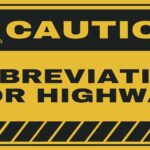Abbreviation for Highway – have you ever wondered what those familiar road signs and symbols really mean? If you’ve driven on highways, you’ve likely encountered abbreviations like “HWY” or “Fwy” and may have asked yourself, “What do these letters stand for, and why are they used?” Understanding highway abbreviations can help you navigate with ease and make sense of road signs across the country.
In this article, we’ll dive into the most common abbreviations for highways, why they exist, and how they affect your driving experience. Keep reading to get the inside scoop and become a savvy road traveler!
What Does the Abbreviation for Highway Mean?
Before diving into the specific abbreviations used for highways, it’s crucial to understand what “highway” itself means.
A highway is a main road designed for fast traffic, typically connecting cities, towns, and other significant places. Highways are designed to accommodate higher speeds and larger volumes of traffic than regular roads. They can be either freeways, expressways, or other types of roads that allow for efficient, long-distance travel.
Definition of Highway
The definition of highway dates back to medieval times when the word referred to any major road or path connecting important locations. Historically, highways were often built for the use of kings and their royal entourage. Over time, the term evolved to encompass modern road systems used by the general public.
In modern usage, highways are often a critical part of a country’s infrastructure, providing routes for both passenger vehicles and freight transportation.
What is the Standard Abbreviation for Highway?
There are several common abbreviations used for highways, but the two most widely recognized are HWY and Hwy. The abbreviation “HWY” is often used in official signage, while “Hwy” tends to appear more in casual contexts.
Common Abbreviations
- HWY – This is the most formal abbreviation, typically used on road signs and maps.
- Hwy – A more informal version of the abbreviation, often seen in addresses or less formal contexts.
Regional Variations
While HWY is commonly used in the United States and Canada, some regions may use other terms. For example, in the UK, motorway is used instead of “highway” for major roads designed for fast traffic. Despite this, the abbreviation HWY is still recognizable due to the widespread influence of American culture and infrastructure.
Highway vs. Other Transportation Terms
Although the term “highway” is widely used, it is not synonymous with other terms like road, street, or freeway. Each of these terms has specific meanings in the context of transportation, and understanding these distinctions can help clarify when to use the term “highway” and when to choose a different word.
Differences Between Highway, Road, and Street
- Highway – A main road designed for faster traffic, usually connecting cities or important areas.
- Road – A more general term that can refer to any path or route used for transportation, whether it’s a local street or a major highway.
- Street – Typically a road within a town or city, often with residential or commercial properties along it.
Types of Highways
- Interstate Highways – Major routes that connect multiple states, forming the backbone of long-distance travel in the U.S.
- Expressways – High-speed roads with limited access, similar to highways but often with fewer interchanges.
- Freeways – Roads designed for fast-moving traffic with no intersections, often used for long-distance travel.
Abbreviation: Is It an Acronym or an Abbreviation?
An important distinction in language is the difference between acronyms and abbreviations. In this case, HWY is an abbreviation, not an acronym.
Acronyms vs. Abbreviations
- Abbreviation – A condensed version of a word or phrase. For example, HWY is an abbreviation for highway.
- Acronym – A type of abbreviation formed from the first letters of a phrase, such as NASA (National Aeronautics and Space Administration).
Since HWY is simply a shortened form of the word highway, it is not considered an acronym.
How to Pronounce “HWY” and “Hwy”
When it comes to pronunciation, HWY and Hwy are generally pronounced the same way: as “highway”. However, in casual conversation, people might drop the “y” sound and simply say “H-W” (pronounced “aitch-double-u”) when referring to the abbreviation.
Common Pronunciations
- HWY – “Highway” (pronounced as the full word)
- Hwy – “Highway” (pronounced the same, though occasionally you may hear “H-W” in more technical contexts)
It’s important to use the proper pronunciation depending on your audience and setting. While saying “H-W” might be more technical, for the most part, “highway” will work in everyday conversation.
Real-World Examples of “HWY” in Use
The abbreviation HWY is commonly seen in road signs, maps, and addresses. Understanding how and where these abbreviations appear can give us insight into their practical use.
Road Signs and Markings
In the U.S., it’s typical to see road signs that display HWY to denote a highway, such as “HWY 101” or “HWY 50”. These signs are meant to provide clear and concise information to drivers, allowing for easier navigation.
Common Usage in Maps and Addresses
The abbreviation also appears frequently in GPS systems, printed maps, and even in residential addresses. For example, an address like 123 HWY 280 refers to a location on Highway 280. Here, the abbreviation is used for convenience and brevity.
Synonyms for Highway
While highway is a commonly used term, there are several synonyms, each with its specific meaning. Here are some common alternatives:
Common Synonyms for Highway
- Freeway – A major highway that is designed for high-speed travel, often without intersections.
- Expressway – A high-speed road, typically used for long-distance travel, though it may have some interchanges.
- Motorway – The British equivalent of an American freeway, designed for long-distance, high-speed travel.
Contextual Differences
- Byway – A smaller, less-traveled road that is often rural. It can be seen as the opposite of a highway.
- Trail – A much smaller path, typically in rural or natural areas, used for walking or less formal transportation.
Antonyms for Highway
When we think about antonyms for highways, we’re often referring to smaller, less-traveled paths. Here are some antonyms to consider:
Common Antonyms
- Local Road – A road meant for local traffic, often slower and less direct.
- Dead-End Street – A street that does not connect to other major routes, typically found in residential areas.
Understanding these antonyms is essential when navigating between rural and urban areas, as it helps determine the type of road one is traveling on.
The Historical and Cultural Significance of Highways
Highways have a rich history that goes beyond just being a method of transportation. They have been central to the development of societies, economies, and cultures.
The Rise of Highways in Modern Society
In the U.S., the Interstate Highway System, initiated in the 1950s, revolutionized travel and commerce. This network of highways allowed goods and people to move across the country more quickly and efficiently than ever before.
Highways and Cultural Impact
Highways have cultural significance, symbolizing freedom and connectivity. For example, Route 66, often referred to as the “Main Street of America,” became an iconic highway in U.S. culture, representing both travel and opportunity.
Why Does the Abbreviation Matter?
Using an abbreviation like HWY or Hwy has practical benefits, especially in terms of communication efficiency.
Practical Reasons for Using Abbreviations
- Space-Saving – Abbreviations help save space on road signs, maps, and in written documents.
- Clarity – Abbreviations like HWY are immediately recognizable, making directions clearer and easier to understand.
Legal and Regulatory Importance
In official documents, road signage, and navigation systems, using consistent abbreviations ensures that all information is understood universally.
When and Where Should You Use the Abbreviation for Highway?
Knowing when and where to use HWY or Hwy is key for proper communication. Here are some guidelines:
Use in Road Signs
Always use HWY in road signs and official documents. For example, “HWY 40” or “HWY 101” is the standard way to represent major highways.
Use in Informal Contexts
In informal writing, such as addressing envelopes or using GPS, Hwy is commonly used. For example, an address like 123 Hwy 280 would be acceptable.
Examples of Highway Abbreviation in Context
To see the HWY abbreviation in action, let’s look at some real-world examples:
- “Take HWY 101 North to reach San Francisco.”
- “You’ll find the exit for Hwy 50 after three miles.”
- “Our new office is located at 5000 Hwy 280.”
These examples show how the abbreviation fits seamlessly into directions, signage, and addresses.
Final Thoughts
The abbreviation for highway – whether HWY or Hwy – is more than just a shortcut in writing. It’s a symbol of the efficiency and practicality required for modern transportation. Whether you’re navigating a road trip or reading a map, understanding the abbreviation for highway in usa ensures that you can get from one place to another with ease. By recognizing the historical and cultural impact of highways, we also come to appreciate the role they play in shaping our societies and economies.
Next time you hit the road, you’ll have a deeper appreciation for the highways that help keep our world moving.

Jone Smith is an experienced blogger and content creator behind Verbo Mize. With a passion for storytelling and insightful commentary, Jone brings a wealth of knowledge on diverse topics. His expertise in blogging, combined with a keen eye for detail, makes his work both informative and engaging, offering readers valuable perspectives on a wide range of subjects.







